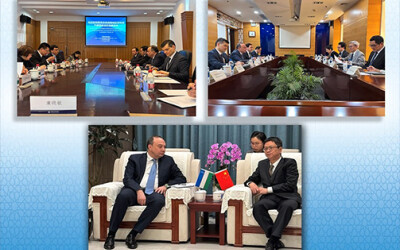The first meeting of the Uzbek-Chinese Expert Council was held in Beijing

On March 22, 2025, in Beijing, the delegation of Uzbekistan, headed by the Director of the Institute for Strategic and Regional Studies under the President of the Republic of Uzbekistan (ISRS) Eldor Aripov, took part in the first meeting of the Uzbek-Chinese Expert Council.
The event, organized by ISRS jointly with the Institute of Russia, Eastern European & Central Asian Studies of the Chinese Academy of Social Sciences, brought together representatives of expert and analytical, scientific and academic circles, as well as diplomatic missions of the two countries.

The main topic of the first meeting of the expert council was the discussion of the consequences of climate change and the prospects for Uzbek-Chinese cooperation in the field of ecology and the introduction of “green” technologies.
For reference: Memorandum on the establishment of the Uzbek-Chinese Expert Council was signed in October 2024. The creation of the Council became an important mechanism for expert support of the practical implementation of the agreements reached following the results of the Uzbek-Chinese summit held on January 24-25, 2024.
This platform will allow experts from leading analytical and research centers of the two countries to regularly hold consultations on current issues of mutual interest, as well as jointly develop new initiatives to strengthen the multilateral dialogue between Tashkent and Beijing.
During the meeting, Eldor Aripov focused on the environmental challenges facing Central Asia. He noted that the region is acutely feeling the effects of climate change: rising temperatures, more hot days, and reduced water resources. "Joint coordinated efforts are needed to adapt to climate change and mitigate its effects," the expert said.
For his part, the head of the Chinese delegation Sun Zhuangzhi emphasized the high level of bilateral relations and confirmed readiness for active cooperation with Uzbek partners. He noted that China, as a world leader in sustainable development, is interested in deepening cooperation in these areas.
At the end of the meeting, the parties signed the Work Plan of the Expert Council for 2025. The document provides for holding regular meetings of the Council, organizing joint research on topical issues, publishing scientific articles, and preparing for upcoming high-level events.

Previous

On March 24, 2025, as part of the visit of the Uzbek delegation to China, the director of the Institute for Strategic and Regional Studies under the President of the Republic of Uzbekistan (ISRS) Eldor Aripov held a series of meetings with the heads of leading scientific and analytical centers of the PRC.
28.03.2025





